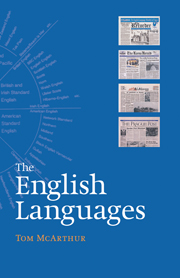Summary
stand.ard (stan'dard), n. 1. something considered by an authority or by general consent as a basis of comparison. 2. an object regarded as the most common size or form of its kind. 3. a rule or principle that is used as a basis for judgment. 4. an average or normal quality, quantity, or level: The work isn't up to his usual Standard. 5. Standards, the morals, ethics, customs, etc., regarded generally or by an individual as acceptable. 6. the authorized exemplar of a unit of weight or measure. 7. a certain commodity in or by which a basic monetary unit is stated: gold Standard…. 12. a flag indicating the presence of a sovereign or public official. 13. a flag or emblematic figure used as a rallying point for anarmy, fleet, etc….
(defmition, Random House Webster's College Dictionary, New York: 1991)Flags and measures: The king's Standard
In the year 1138, the English and the Scots met in battle at Cowton Moor in Yorkshire. In the normal course of events, language had little impact on war between these ancient enemies and war had little impact on language, but the victory of the English at Cowton was an exception. Their rallying point was unusual: a cluster of flags on a ship's mast mounted on a carriage. When the contemporary observer Richard of Hexham later wrote about this stränge device, he quoted a couplet which called it a 'Standard', because ‘it was there that valour took its stand’. Both the device and the name were so novel - and proved so effective - that the encounter came to be called, not the Battle of Cowton, in the usual way of things, but the Battle of the Standard.
Richard of Hexham has provided The Oxford English Dictionary with its earliest citation of Standard, in the process letting us know that in the twelfth Century the word was associated with Germanic stand ('be upright in one place’) and not Latin extendere ('to Stretch out’), which the OED gives as its proper source. But associating a battle flag with a place where soldiers ‘stand hard’ in the face of their enemies made eminent sense in the twelfth Century.
- Type
- Chapter
- Information
- The English Languages , pp. 102 - 137Publisher: Cambridge University PressPrint publication year: 1998



